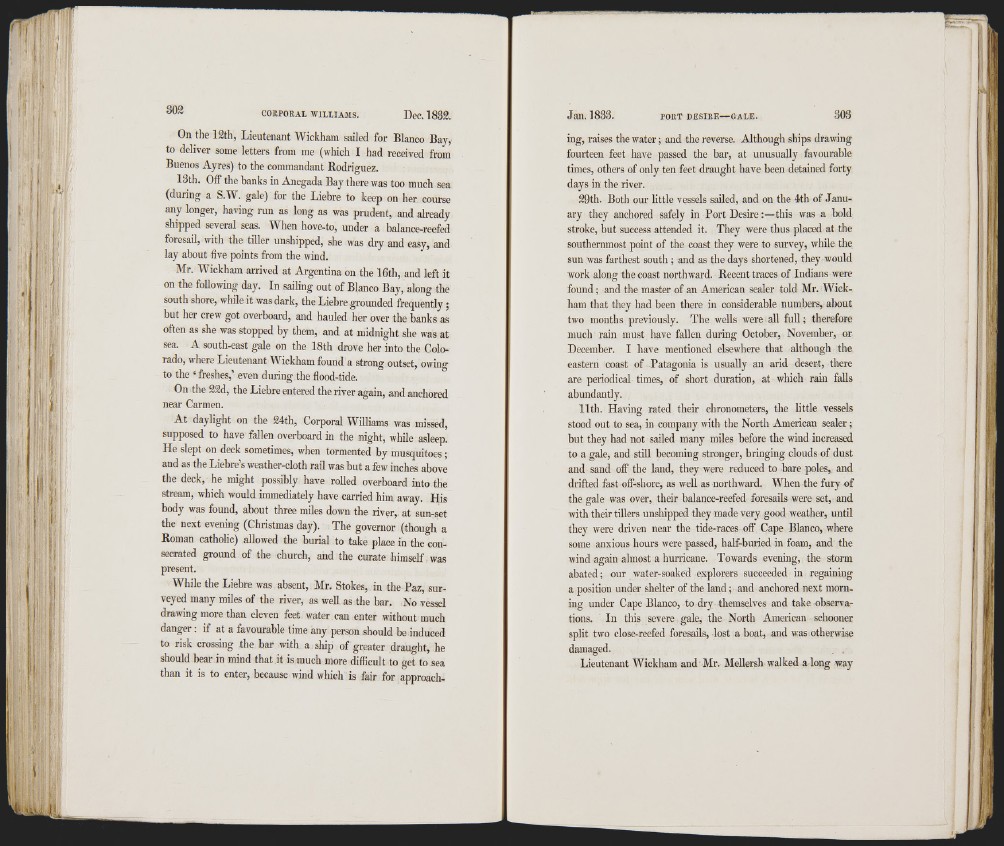
- i: i ri :í| r l,i : ! r: l:ll
¡ !
■ ‘»Vi '
- f • <
'■ I' 1
*1
I 'I
Jl
■ í
ill í¡!
i, ).
,L
i í
i í «
ilív:. I'
302 CORPORAL WILLIAMS. Dec. 1832.
On the 12th, Lieutenant Wickham sailed for Blanco Bay,
to deliver some letters from me (which I had received from
Buenos Ayres) to the commandant Rodriguez.
13th. Off the hanks in Anegada Bay there was too much sea
(during a S.W. gale) for the Liehre to keep on her course
any longer, having run as long as was prudent, and already
shipped several seas. When hove-to, under a halance-reefed
foresail, with the tiller unshipped, she was dry and easy, and
lay about five points from the wind.
Mr. Wickham arrived at Argentina on the 16th, and left it
on the foUowing day. In sailing out of Blanco Bay, along the
south shore, while it was dark, the Liebre grounded frequently ;
but her crew got overboard, and hauled her over the banks as
often as she was stopped by them, and at midnight she was at
sea. A south-east gale on the 18th drove her into the Colorado,
where Lieutenant Wickham found a strong outset, owing
to the ‘ freshes,’ even during the flood-tide.
On the 22d, the Liebre entered the river again, and anchored
near Carmen.
At daylight on the 24th, Corporal Williams was missed,
supposed to have fallen overboard in the night, while asleep.
He slept on deck sometimes, when tormented by musquitoes ;
and as the Liebre’s weather-cloth rail was but a few inches above
the deck, he might possibly have rolled overboard into the
stream, which would immediately have carried him away. His
body was found, about three miles down the river, at sun-set
the next evening (Christmas day). The governor (though a
Roman catholic) allowed the burial to take place in the consecrated
ground of the church, and the curate himself was
present.
While the Liebre was absent, Mr. Stokes, in the Paz, surveyed
many miles of the river, as well as the bar. No vessel
drawing more than eleven feet water can enter without much
danger: if at a favourable time any person should be induced
to risk crossing the bar with a ship of greater draught, he
should bear in mind that it is much more difficult to get to sea
than it is to enter, because wind which is fair for approachJan.
1833. PORT DESIRE GALE. 303
ing, raises the water; and the reverse. Although ships drawing
fourteen feet have passed the bar, at unusually favourable
times, others of only ten feet draught have been detained forty
days in the river.
29th. Both our little vessels sailed, and on the 4th of January
they anchored safely in Port Desire:—this was a hold
stroke, but success attended it. They were thus placed at the
southernmost point of the coast they were to survey, while the
sun was farthest south ; and as the days shortened, they would
work along the coast northward. Recent traces of Indians were
found; and the master of an American sealer told Mr. Wickham
that they had been there in considerable numbers, about
two months previously. The wells were all fu ll; therefore
much rain must have fallen during October, November, or
December. I have mentioned elsewhere that although the
eastern coast of Patagonia is usually an arid desert, there
are periodical times, of short duration, at which rain falls
abundantly.
Ilth . Having rated their chronometers, the little vessels
stood out to sea, in company with the North American sealer;
but they had not sailed many miles before the wind increased
to a gale, and still becoming stronger, bringing clouds of dust
and sand off the land, they were reduced to bare poles, and
drifted fast off-shore, as well as northward. When the fury of
the gale was over, their balance-reefed foresails were set, and
with their tillers unshipped they made very good weather, until
they were driven near the tide-races off Cape Blanco, where
some anxious hours were passed, half-buried in foam, and the
wind again almost a hurricane. Towards evening, the storm
abated; our water-soaked explorers succeeded in regaining
a position under shelter of the land; and anchored next morning
under Cape Blanco, to dry themselves and take observations.
In this severe gale, the North American schooner
split two close-reefed foresails, lost a boat, and was otherwise
damaged.
Lieutenant Wickham and Mr. Mellersh walked a long way